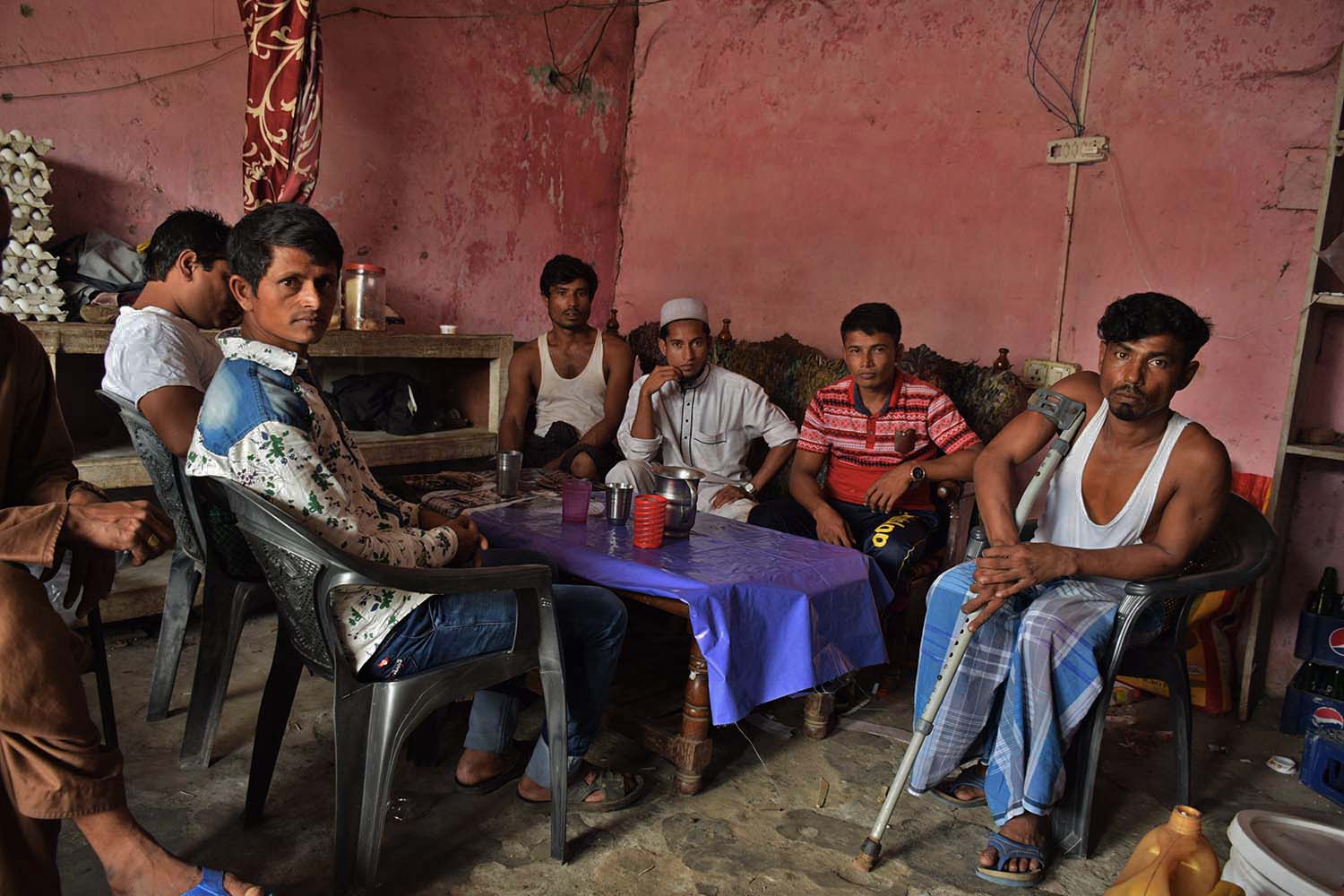“Run for your life, son!”
These were the last words Mohammad Akhlas’s father said to him.
Akhlas, a Rohingya Muslim, reached Jammu along with his friend Jan-e-Aalam, almost 20 days earlier, from the Rakhine state of Myanmar.
While on the run from the ‘brutal military assault’, Akhlas’s father gave up as he couldn’t run anymore.
“My father just wanted us to run for our life by which ever route we could find,” says Akhlas in a very broken Hindi-Urdu.
However, his experiences still send a chill through one’s spine.
September 5, Narwal, Jammu
Kiryantalab Narwal, in Jammu region, is no different than a slum at its worst in any part of the world. This is the place where Rohingyas are staying on rent since past many years. The moment one enters the area, one can see grief-stricken faces living amidst rags. Children, almost none of whom had a full-clothed body, were so weak that one could count their ribs.
However, at that point, they were playing, smiling and singing in their native language.
It is almost 12: 30 in the day. A heated argument breaks between some middle aged men in a partially damaged shed. The place acts as a local restaurant and it is break time for the laborers who have come from Myanmar a few years ago.

Rohingyas in the makeshift restaurant at the camp in Narwal, Jammu. FPK Photo/ Muneem Farooq Itoo
Both Akhlas and Aalam were sitting in a makeshift restaurant and were trying very hard not to listen to the conversations of the others. They were obviously talking about the ‘brutalities’ happening back ‘home’.
According to United Nations, since the violence began on August 25 in the Rakhine state of Myanmar, more than 300,000 Rohingyas have fled the state and most have crossed into the neighboring country of Bangladesh.
Recently the United Nations chief Antonio Guterres called on Myanmar to suspend its violence against the Rohingyas in the Rakhine state. He acknowledged that the Muslim minority was facing ‘ethnic cleansing.’
“When one-third of the Rohingya population had to flee the country, can you find a better word to describe it?” he replied to a question during a press conference.
The young duo fled like thousands of others, to escape the ‘brutal military slaughter against the minority Muslims’. After reaching the deep forests, Akhlas had to leave his father as he couldn’t go further.
“Son, you’ve to keep moving on whatever track you can find. It is a run for your life”, Akhlas quotes last words he heard from his father.
Along with Jan-e-Aalam and three other persons, Akhlas, after walking miles through the dense forests, hills and crossing Nuf River, made it into Bangladesh.
“We hardly had an idea of where we were going,” he tries to say in the most rudimentary form of Urdu.
He adds, “We had no road map but we never had a choice but to keep moving”.
Both of them made this run for their life without any food for almost three days but they never gave up and kept moving on.
According to reports, more than 400 Rohingyas have been killed after their villages were burnt. Also, dozens of children have drowned while trying to cross into neighboring Bangladesh. The aid agencies have not been able to reach the affected areas with basic food and medicine supplies leading to a humanitarian crisis.

Rohingya children playing in the slum. FPK Photo/ Muneem Farooq Itoo
In a report by the Guardian, it was noted that as many as 150 children die every day in Myanmar before they reach their fifth birthday. The report quoted the UN children’s agency while calling for the government to end blocks on humanitarian access to conflict areas.
Both Akhlas and Aalam stayed in Bangladesh for few days and then decided to come to India. Aalam, after taking a long breath says, “We were lucky as we had saved some money that helped us reach India”.
The duo somehow managed to track Aalam’s sister and brother-in-law who are staying here in Kiryantalab Narwal Jammu since 2012.
In 2012, Rohingyas had already faced such violence and Aalam lost, well, everything.

Aalam along with his brother-in-law at their ‘residential’ shed. FPK Photo/ Muneem Farooq Itoo
“I lost my parents in 2012,” he says while losing control of his emotions. He breaks down and cries inconsolably.
His equally hurt friend Akhlas while trying to console him says, “My mother died in 2012 only because treatment and medicines weren’t allowed to reach her.”
Like others, both of them are manual labourers, trying to make ends meet somehow. Aalam left studies in 3rd standard and took up tailoring as a profession. Akhlas made it to the ninth standard and wanted to study more.

“I want to learn and speak good English, “says Akhlas with a smile for the first time during the conversation.
The smile was very short lived as he remembered what happened to their retail store in Rakhine.
“I feel so bad about our retail store that was burnt by the armed forces”, he recalls.
And as every displaced population forced out of their homes, Rohingyas too want to go home. However, they want rights and safety.
“Who wants to live like this? We want to go back home and that would be greatest thing for us, if it’s possible. But we can only do that after our safety is ensured. The government of Myanmar must negotiate and give rights to Rohingya Muslims.”
Akhlas’s ‘mission’ is not complete yet. He wants to earn enough money and go back to the place from where he ran for his life, and find his father.
“The day I reached Jammu, I started working. I don’t want to become rich or something. I want to earn enough, go back, and locate my father. That is my prime concern now,” says a teary eyed Akhlas.
Arif Nazir contributed in this story.












